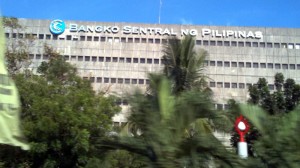Interest rates seen to rise this week

Borrowing costs are set to head north with the Bangko Sentral ng Pilipinas seen further tightening policy settings this week amid efforts to stabilize consumer prices. INQUIRER.net file photo
MANILA, Philippines–Borrowing costs are set to head north with the Bangko Sentral ng Pilipinas (BSP) seen further tightening policy settings this week amid efforts to stabilize consumer prices.
Majority of banks asked by the Inquirer said the monetary settings would be tightened one way or the other at the BSP Monetary Board’s (MB) policy-setting meeting this Thursday.
“The Philippine central bank is no longer in a comfortable position: growth momentum is slowing but headline inflation is accelerating,” HSBC economist Trinh Nguyen said last week.
HSBC and local lender Security Bank expect the central bank to keep its key benchmark interest rates on hold for now and resort to raising either the banks’ reserve requirements or the rates on special deposit accounts (SDA).
Bank of the Philippine Islands (BPI) and British lender Barclays both see the BSP increasing its policy rates by 25 basis points this Thursday. BPI also sees the central bank pairing the rate adjustment with an increase in the reserve requirements or the SDA rates.
Article continues after this advertisementDutch financial giant ING, Britain’s Standard Chartered and the local BDO Unibank all see the BSP keeping benchmark interest rates on hold and wait till at least the July meeting before making a move.
Article continues after this advertisementThe BSP’s overnight borrowing and lending rates are at record lows of 3.5 and 5.5 percent, respectively, since late 2012.
At its last two policy meetings, the BSP raised the bank deposit reserve requirements by a total of two percentage points. This requirement for banks to set aside more of their clients’ deposits as reserves means more money would sit idle in bank vaults.
Moves to tighten policy settings come as consumer prices rose at a pace that made monetary authorities uncomfortable. Last May, inflation reached a 30-month high of 4.5 percent or dangerously close to the top end of the central bank’s target range for the year of 3 to 5 percent.
This year, the BSP expects inflation to average 4.3 percent, faster than last year’s 3 percent. More worrisome for the BSP is next year’s inflation target, which moves down to a lower range of 2 to 4 percent.
“The trajectory of inflation in the coming months shows that inflation may exceed the 2 to 4 percent inflation target range for (next year) in the first quarter of 2015,” ING economist Joey Cuyegkeng said.
Meanwhile, BSP Deputy Governor Diwa C. Guinigundo dismissed concerns that the central bank’s moves to tighten policy settings would choke economic growth.
“As far as we’re concerned, the economy is doing well,” Guinigundo said, signaling to the market that growth would not weigh too heavily on the Monetary Board’s mind on Thursday. He noted that over the past 15 years, growth in the Philippines averaged 4.9 percent every quarter. “We had 5.7 percent in the first quarter [of 2014]. We’re still above [the average],” he said.